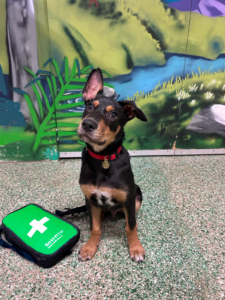 Summer brings longer days, warmer weather, and plenty of outdoor adventures, making it a wonderful time to create memories with your furry friends. However, it also introduces a set of risks and potential emergencies that pet owners should be prepared for. Knowing the basics of pet first aid is crucial in ensuring your pet’s safety and well-being during these summer months. Here’s a guide to essential first aid skills that every pet owner should have at their fingertips.
Summer brings longer days, warmer weather, and plenty of outdoor adventures, making it a wonderful time to create memories with your furry friends. However, it also introduces a set of risks and potential emergencies that pet owners should be prepared for. Knowing the basics of pet first aid is crucial in ensuring your pet’s safety and well-being during these summer months. Here’s a guide to essential first aid skills that every pet owner should have at their fingertips.
Recognising Heatstroke and Dehydration Symptoms:
- Excessive panting or difficulty breathing
- Increased heart rate
- Drooling, weakness, or lethargy
- Vomiting or diarrhoea
- Elevated body temperature
Immediate Actions:
Move your pet to a cooler, shaded area immediately. Apply cool (not cold) water to help lower their body temperature. You can use wet towels or gently pour water over their body. Allow your pet to drink small amounts of cool water or lick ice cubes. Contact your veterinarian immediately, as heatstroke can be life-threatening.
Managing Cuts and Scrapes
Outdoor activities can sometimes lead to minor injuries. For cuts and scrapes:
- Clean the wound gently with water and mild antiseptic.
- Apply pressure with a clean cloth to stop any bleeding.
- Cover the wound with a sterile bandage.
- Monitor the wound for signs of infection and consult your vet for further care.
Handling Paw Pad Burns
Hot surfaces can burn a dog’s sensitive paw pads.
- Check the paw pads for redness, blisters, or signs of burn.
- Rinse the paws with cool water and apply a soothing, pet-safe antiseptic.
- Prevent your dog from licking the affected area.
- Contact your vet for advice on further treatment and care.
Insect Bites and Stings
Insects can be more than just a nuisance; some can cause allergic reactions.
- Remove any visible stinger carefully with tweezers.
- Apply a cold pack to the area to reduce swelling and pain.
- Watch for signs of an allergic reaction, including swelling, hives, or difficulty breathing.
- If you notice severe symptoms, seek veterinary care immediately.
Water Safety
If your dog enjoys swimming:
- Never leave your pet unsupervised near water.
- Rinse your dog after swimming to remove chlorine or salt from their fur.
- Be aware of water currents and tides when swimming in natural bodies of water.
- Consider a dog life jacket for extra safety, especially for breeds that are not strong swimmers.
While it’s essential to enjoy the summer with your pet, being prepared for potential emergencies can make all the difference. A well-stocked pet first aid kit and knowledge of basic first aid procedures can help you address minor injuries and stabilize your pet until you can get professional veterinary help. Remember, prompt and calm action is key in any emergency situation. Here’s to a safe and enjoyable summer with your pup!